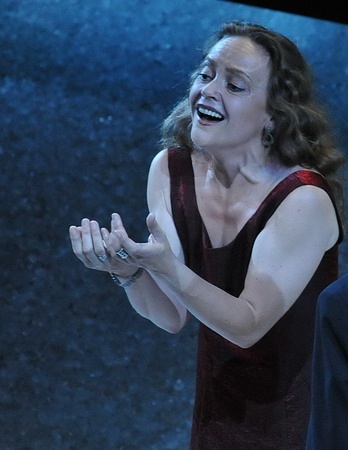The premiere of Hugo Weisgall’s 1993 Esther at New York City Opera occupied my mind for several days – though maybe not for the best reasons. As I wrote earlier, it is a work that emanates, belatedly, from what might be called The Twelve-Tone Industrial Complex, that uptown conservatory lobby of the 1950s and 60s, which was based on a widely-held notion that Tonality Is Dead.

Evelyn Herlitzius singing Brünnhilde in Budapest
Tonight I’ll attend the Berlin Philharmonic’s concert at Carnegie Hall featuring Schoenberg’s Erwartung, sung by Evelyn Herlitzius. (Simon Rattle fills out the program conducting Schoenberg’s First Chamber Symphony and Brahms’ Second Symphony.)
The work is atonal but, unlike Esther, written before Schoenberg’s fleshing-out of Serialism. Though slim on plot, it is viscerally theatrical, and daring in its use of materials (Schoenberg’s score avoids any repetition of motives or themes – something of which Weisgall is suspected as well).
Vamping up, I re-read Charles Rosen‘s brief yet insightful 1975 monograph on Schoenberg, and came across some interesting passages that would have been very instructive back in the 50s and 60s:
“[Schoenberg’s] works composed after the invention of Serialism in 1921 have, in a strange way, become a normal part of today’s music; they are not often heard, but they are the works that have been imitated by hundreds of composers all over the world.”
and
“To speak of the ‘breakdown of tonality’… is to beg the question, as we can see if we look to a similar late-nineteenth century development in literature… Free play of meaning is essential [to Mallarme] … we cannot speak of the breakdown of a linguistic system in Mallarme, or the decline of French. The ‘breakdown of tonality’ is similarly a fiction.”
Though this may not be precisely the point Rosen is making, I’d say that too many composers have believed the myth of the “breakdown of tonality”, an overly simplistic conceit, and a mandate that music not lean on a “broken” system. Tonal or not, it seems to me the work need only be true to its own materials, and be effective.
Or as our La Cieca once said, “Talent trumps everything – even hard work!”
I’ll report back later with some words about the performance. If you don’t have tickets, Herlitzius’ Erwartung is also available, in a performance from November 7 at Disney Concert Hall in Los Angeles, via the Berlin Philharmonic’s gorgeous new Digital Concert Hall mini-site. Alas, there is a download fee (€9.95), if you have that many Euros. (I don’t, and they refuse to accept acorns.) While there’s no Herlitzius Erwartung to be found on the YouTube, here is some very rewarding Jessye:
[kml_flashembed movie="http://www.youtube.com/v/rErXOMu7DW8" width="425" height="350" wmode="transparent" /]


